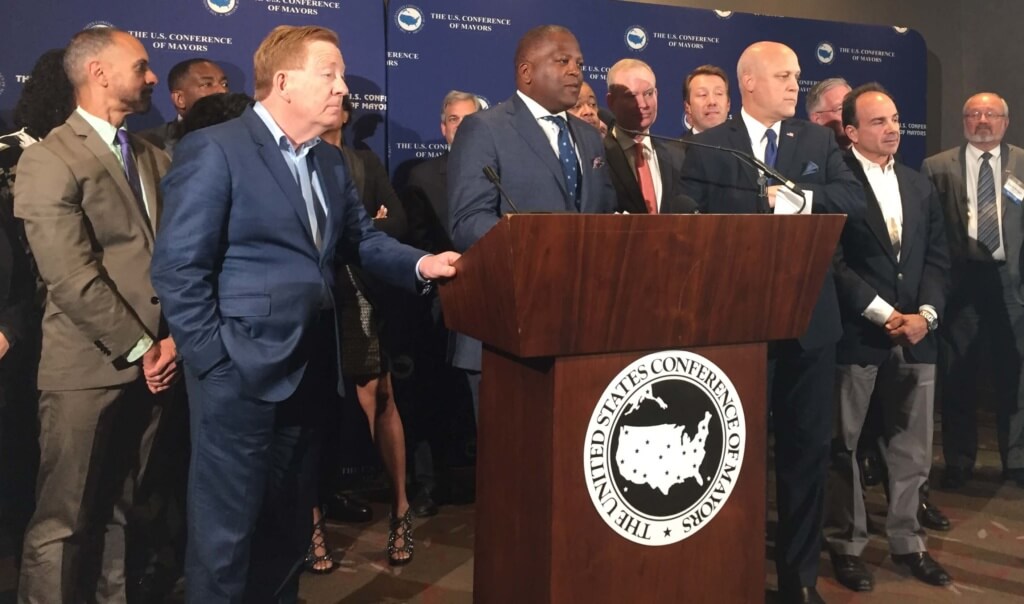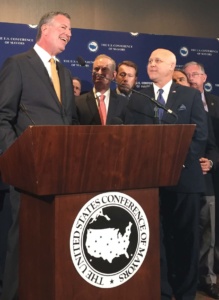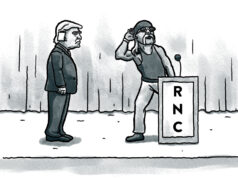
Dozens of U.S. mayors attended a press conference to promote the need for federal cooperation on the topics of public safety and infrastructure, but when William Crum of The Oklahoman asked if any had endorsed Donald Trump for president, no one raised a hand.
“We have to recognize our nation is changing,” said New York City Mayor Bill de Blasio Friday at the Colcord Hotel in Oklahoma City. “We are becoming a nation where cities are the center of that which makes us strong. We’ve heard so much doom-saying about our cities, it sounds like something you would have heard 20 or 30 years ago or more.”

De Blasio wasn’t the only mayor to reference Trump’s harsh rhetoric on the topic of crime in urban centers.
“People who speak from ignorance often get things wrong. And Mr. Trump did that in this instance,” said New Orleans Mayor Mitch Landrieu. “When you stain with a broad brush and you focus people’s attention on a very narrow thing, you often lose the bigger picture.”
The picture painted Friday by de Blasio, Landrieu, Mayor Stephen Benjamin of Columbia, South Carolina, and U.S. Conference of Mayors President Mick Cornett was one of vibrant and culturally diverse urban areas that need federal support for crumbling infrastructure and strained public-safety resources.
“If you are around our group very often, you will — I think — appreciate the fact that we are largely non-partisan,” said Cornett, OKC’s mayor. “We are here to solve problems. We are not here to increase the partisan divide that affects America. We are here to bridge it.”
Speaking of bridges, de Blasio emphasized the need for Congress to find a path forward on U.S. infrastructure investments.

“Today’s cities are the center, the core of the economy. They are more and more where our young people want to be. They are where our companies want to be. And that means we have to address the infrastructure issue,” de Blasio said. “President Cornett is right: There is an incredible sense of bipartisanship in this organization. We all can tell you the stories of the bridges that we’re struggling to keep from falling down, and the roads that are sub-standard that our people have to live with every day. Our water supply; all the other challenges that we face trying to keep our cities going.”
De Blasio praised Cornett and other mayors for helping push Congress to pass a five-year, $305 billion highway bill in 2015.
“It is one of the issues where you’re going to find the clearest consensus in the country,” de Blasio said. “Mayors are going to be a united force as we look forward to a new administration.”
One item not included in the 2015 highway bill was a proposed increase of the gas tax, which accounts for a large portion of highway funding. Asked if the Conference of Mayors supports increasing the gas tax, the assembled mayors answered neither yes nor no.
“I think the discussion that was had in Washington last time is obviously there’s differences in opinion of the gas tax,” de Blasio said. “If there’s a preference to fund it another way that gets us there, that would be acceptable too.”
Cornett noted that Oklahoma has lower gas taxes than surrounding states.
“There’s a relationship between a collection of gas taxes and a quality of state highway roads,” he said.
James Brainard, mayor of Carmel, Indiana, noted that the increase in electric cars and more efficient gas mileage might be a good reason to look at finding a different funding source in the future.
“We do need to look at a system where the tax is charged not on the gallons used but by the miles driven,” Brainard said.
Different states, different situations
On the topic of public safety, Cornett highlighted mental health and substance abuse treatment as key areas deserving of future federal investment under either a Clinton or Trump administration.
But of the four mayors who did most of the speaking at Friday’s press conference, two are governing in states that have expanded Medicaid under the Affordable Care Act, and two are governing in states that have so far avoided doing the same.
“Obviously, I believe that having access to Medicaid gives a much better chance for anyone to get health care they need, whether it’s mental health care or physical health care,” said de Blasio. “And that’s one of the things we need to change in policy overall is we need to create parity between mental health care and physical health care in this country.”
New York was one of the early adopters of Medicaid expansion after the ACA passed, and Louisiana passed an expansion of its own earlier this year under Gov. John Bel Edwards. More than 250,000 people have signed up for coverage already, according to reports.
“I think that greater access to Medicaid is very helpful in ensuring that people have mental health services, but honestly we need something much greater than that,” de Blasio said.
Landrieu agreed.
“I obviously think that the more people that have access to affordable health care — that can actually get on the front end — is going to save us more money on the back end. So, for Louisiana, I think it was a good decision and I do think it was helpful,” Landrieu said. “However, I want to disabuse everybody of the notion that that alone is even a smidgen of a way to what it is President Cornett alluded to just a moment ago — this broad umbrella of criminal justice reform and this issue of over-incarceration. The overwhelming majority of money that is spent on mental health is actually spent behind the prison gate.”
In March, the federal Health and Human Services agency put out a report highlighting the importance of Medicaid expansion in providing mental health access.
“Today’s report shows that Medicaid expansion is an important step states can take to address behavioral health needs, including serious mental illness and opioid and other substance use disorders,” HHS Secretary Sylvia M. Burwell said in a press release.
In 2013, the National Alliance on Mental Illness also issued a report calling for greater adoption of Medicaid expansion to improve access to mental health and substance abuse services.
After Friday’s press conference, Cornett was more careful in his response to the Medicaid expansion question.
“The practical answer is, I don’t want to get involved in the politics of why we don’t have it,” he said. “But, like Mayor Landrieu said, that’s a small part of the situation we’re talking about anyway. So yeah, if more people had insurance, would that be helpful? I suppose so. But we’ve got to re-think how we’re not dealing with mental health in this country.”
Gov. Mary Fallin has chosen not to expand Medicaid in Oklahoma, and a similar “Medicaid rebalancing” plan in the 2016 Legislature never received a vote.
Fallin was scheduled to represent Trump’s campaign as the U.S. Conference of Mayors heard from representatives of both major presidential campaigns Friday afternoon.




















